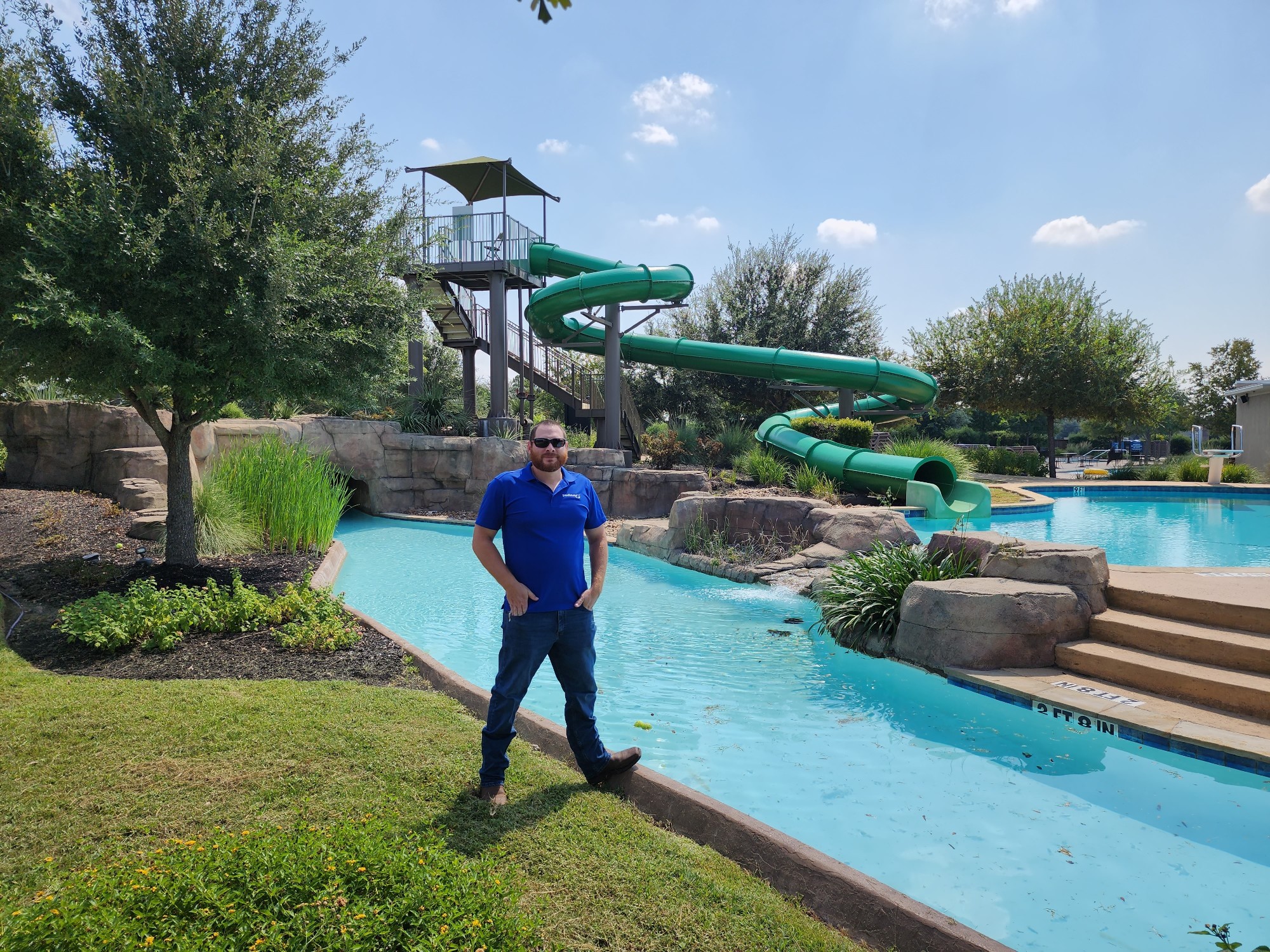The Marine Corps has a mantra: Improvise. Adapt. Overcome. This has served Josiah Powell well in both his military and pool industry careers.
As a lead field service technician at Houston-based Poolsure’s service and repair department, Powell has been instrumental in getting big projects done on tight deadlines — improvising solutions, adapting to demanding environments, and overcoming challenging obstacles.
Powell has been in the pool industry since he was a teenage lifeguard. He joined the Marine Corps at 18, got married the summer after bootcamp, and served in the infantry for four years. He found it difficult to transition back to civilian life. Employers, even those who claimed to hire veterans, passed him over.
To support his young family, Powell cleaned pools for $10 an hour for another firm. He eventually was promoted to repair technician, a job he’d have to learn on the fly.
Then he found an interesting opportunity at Poolsure, a chemical delivery and water management services company. In 2015, the firm launched a repair and service division. Powell would join industry veteran Kevin McAuley in the new venture. “Together we started a service department with pen and paper and a little bit of know-how and Harbor Freight Tools,” Powell recalls.
Today, he leads a team of seven field service technicians for a company that touts commercial clients such as Legoland Florida Resort, Kalahari Resorts and Schlitterbahn, among destination resorts. The team has thrived under his leadership, in part because Powell trained them to be more than repair experts — they serve as technical sales representatives, as well.
“They listen to the customer and provide concrete solutions in layman’s terms,” says McAuley, director of technical services. “[Powell] is always asking, ‘What is important and what does it take to serve the customer and how can I get in front of our people to help them do that?’
“He’s humble and capable.”
He’s also a guy who gets things done.
Rising to the Occasion
There are two specific jobs that demonstrate Powell’s determination and outside-the-box thinking.
Under normal circumstances, changing two 15,000-pound sand filters would take several days to a week. But Powell didn’t have the luxury of time. The Catholic school pool was a week from hosting a large swim meet. That meant replacing the sand and repairing a blown lateral in less than 24 hours to allow time for the 400,000-gallon pool to heat back up and chemicals to balance.
In most jobs like this, you’d drain the sand from the bottom of the filter, making a big mess of the equipment room. Then you’d scoop it into a truck to haul away. To expedite the process, sewage suction trucks were borrowed from Poolsure’s wastewater and stormwater services division. Two technicians were inside the filter tanks, one scooping sand into the snorkel and the other on clog patrol, beating the 8-inch tube to bust up clumps of sand.
The vehicles made quick work of evacuating the tanks. The task of filling would also require an unconventional method. Rather than order pallets of 50-pound bags, Powell procured 4,000-pound supersacks to crane over the filters. The sacks had pull strings at the bottom, making it easy to dump directly into the units. “I’ve never filled up 30,000 pounds in under 24 hours,” Powell says.
He employed a bit of Marine-like improvising to repair the broken lateral hub. This particular filter model used either a different class of PVC or metric-sized PVC — there’s some debate on that. Either way, a standard 4-inch fitting wasn’t going to work, as it would leave a 1/8-inch gap between the coupling and the pipe. “This wasn’t a part you could find at the pool-supply warehouse,” Powell says. “We had to fabricate a solution in the field.”
Powell made up the difference with rubberized tape, as the fitting didn’t have to be watertight. He then secured it with stainless steel screws in the sidewall.
Quick Swap
For Powell’s next trick, he’d replace two horizontal sand filters and install secondary sanitation equipment within an 8-hour window at Shades of Green, a Walt Disney World resort exclusively for members of the U.S. Armed Forces and their families.
The resort didn’t want to disrupt the pool’s schedule, so Powell and his apprentice were given from 9 a.m. to 4 p.m. to complete a job that should have taken two to three days. Rather than empty, disassemble and haul out the filters piece by piece, Powell cut the plumbing and lifted 6,000-pound units by crane, being careful not to crush the electrical panel in the tight quarters.
The new filters were craned in and installed, and the pool was ready for guests eager to luxuriate.
“The pressure was a factor, however, military training in that situation helps out a lot,” Powell says.
Mission accomplished.




